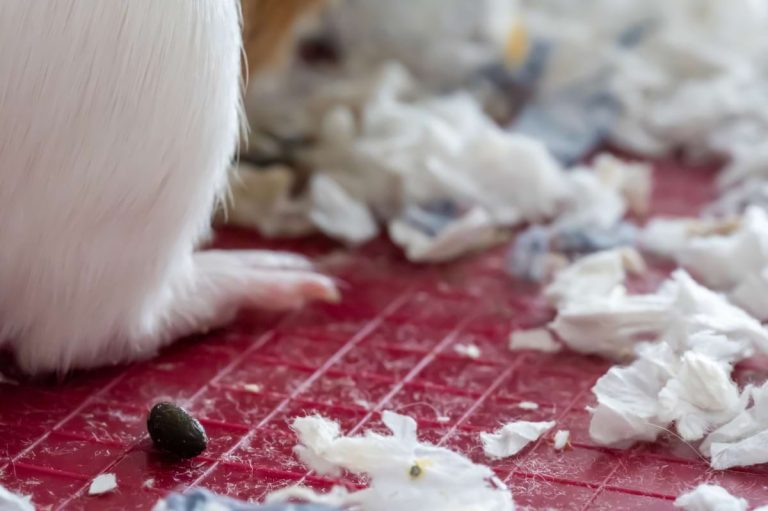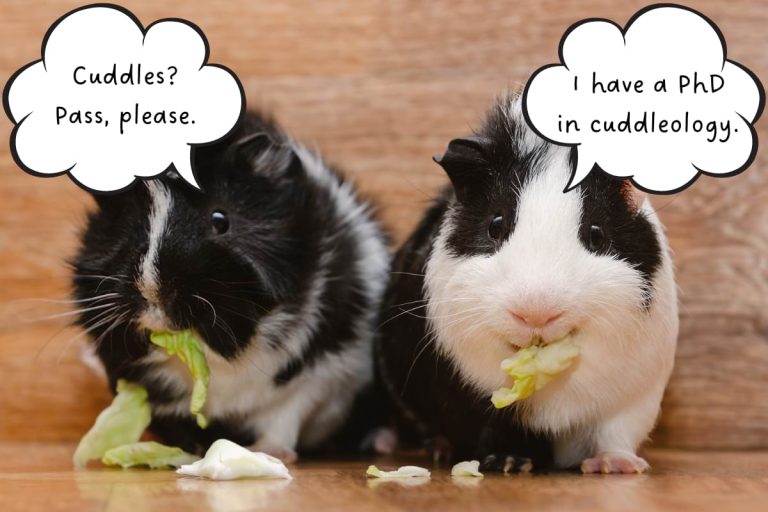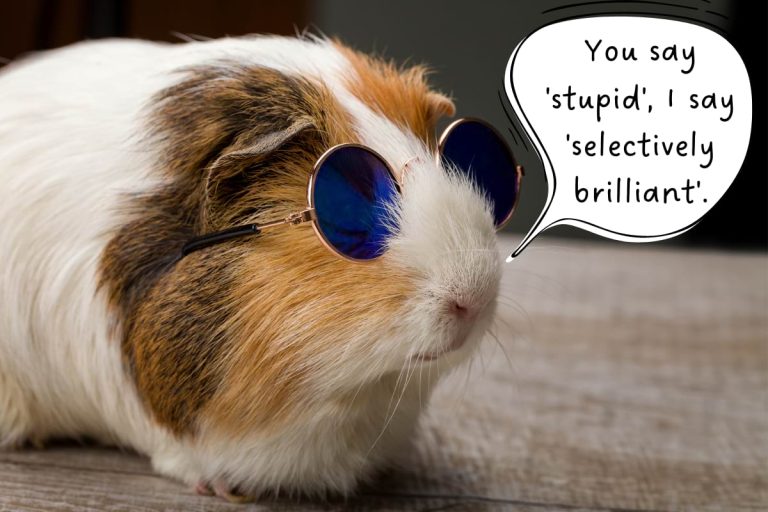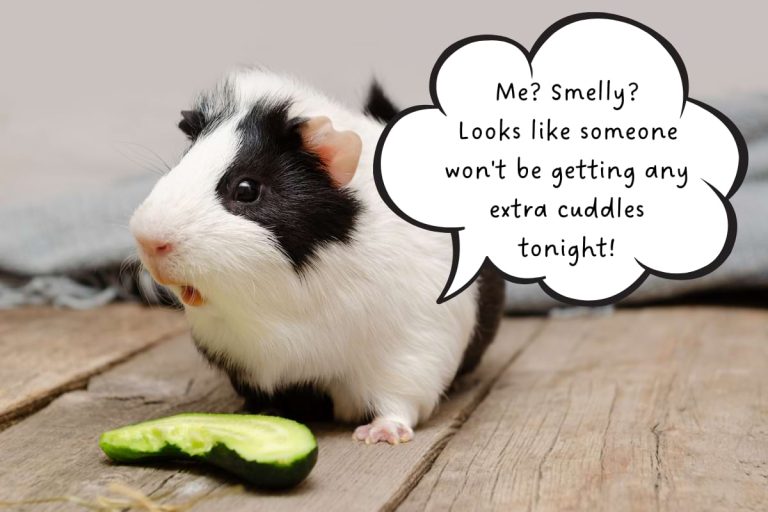What’s the Best Guinea Pig Food? 3 Highest Quality Pellet & Hay Brands

Choosing the best guinea pig food can be confusing. Everyone feels passionately about giving their pets the best, and this leads to a wide variety of opinions. It can be difficult to know who to listen to, which is why today I’ve compiled a list of the best guinea pig food – pellets and hay.
The best guinea pig pellets have a timothy hay base and look very plain to humans. Avoid added dyes, seeds, and fruits, as these are a sure sign of an unhealthy guinea pig food. Instead, look for pellets with no added sugars, chemicals, or artificial ingredients.
It’s also important that the brand has a veterinarian or nutritionist on staff to formulate their diets, so that you know they’re healthy and made by professionals.
Below, we’ll discuss what to look for in guinea pig pellets, how to choose the best guinea pig hay, and our top picks for both.
How to Choose a High-Quality Guinea Pig Pellet
Alongside daily fresh vegetables and unlimited hay, pellets ensure that guinea pigs get all of their daily nutrients. Most veterinarians recommend 1/8 cup per day per piggy, though the quantities on the package may say differently.
Since there are a huge number of manufacturers producing pellets, you may not know which brand to go with. Here are a few tips to help you choose the best pellets for your guineas:
- Avoid pellets with many colorful pieces, fruit bits or seeds (as these are often high in fat and contain ingredients that are unsafe for piggies to eat)
- Skip the super cheap brands – they’re generally full of filler and low on nutrients
- Added Vitamin C is a plus, or boost it naturally with veggies and fruit
- Choose a healthy base hay (Timothy is safe for grown guinea pigs, but Alfalfa is only for babies or pregnant or nursing piggies)
- No chemical preservatives or anything artificial
- Never choose pellets that aren’t specifically for guinea pigs (no rabbit food, for instance)
- Exotic pet veterinarians and/or nutritionists must be on staff to formulate the foods
We asked a licensed veterinarian Megan Conrad from Hello Ralphie to provide her insights on the healthy guinea pig diet and pellets. Here’s what she says:
Because guinea pigs lack a specific enzyme that is required for synthesis of Vitamin C from glucose, it is important they get an exogenous source of Vitamin C through their diet. Even though commercial guinea pig pellets are fortified with Vitamin C, they can become oxidized or lost within 90 days of manufacturing. Pellets should be stored in a cool, dry, and dark container to reduce any breakdown of Vitamin C.
The healthiest pellets are free of additives, artificial colorings, seeds, and dried fruit. This is because extra chemicals to make your pets food pleasing are not needed. Seeds are not a requirement for their diet and too much fruit is a cause of concern due to the high sugar content. Because of pellet instability, you should not rely on pellets alone as the full source of Vitamin C. Fresh produce such as dark leafy greens and small amounts of fruit such as kiwi or oranges are all a good source of ascorbic acid.
Dr. Megan Conrad, BVMS
The healthiest pellets are free of additives, artificial colorings, seeds, and dried fruit.
Dr. Megan Conrad, licenced veterinarian
Best Guinea Pig Food Brands

Let’s look at some of the best guinea pig food brands currently on the market.
1. Oxbow Garden Select

Oxbow Garden Select tops our list as the best guinea pig food. This is the brand my own veterinarian carries and recommends to people with guinea pigs. And this isn’t uncommon—many vets recommend and carry Oxbow products.
This is because Oxbow recruits a team of exotic pet veterinarians and nutritionists to formulate their foods. All pet foods should hire nutritionists or veterinarians to formulate their diets, as this is how you know it’s done right, by a professional in the field.
I personally prefer Garden Select over Oxbow’s Essentials line because Garden Select doesn’t contain cane molasses, soy, or wheat. Guinea pigs don’t need added sugars in their food, and soy and wheat can act as unhealthy fillers.
Oxbow also sells their Garden Select pellets for all guinea pig life stages, so you can feed it to your piggies from birth to their senior years.
That said, Oxbow is a great brand overall, and the Garden Select pellets are slightly pricier. Oxbow Essentials is still a great choice if you need to save some money for those piggy vet bills!
Oxbow also has great lines of hay, treats, and toys.
2. Science Selective Naturals Grain Free Guinea Pig Food

Science Selective Grain Free Pellets are next on our list. I like these pellets because they contain no sugars or artificial ingredients. They’re high in fiber and contain omega 3, which promotes healthy cells and help to prevent disease, and omega 6, which may reduce the chance of heart disease and stroke.
The special thing about this company is that they focus on eco-friendliness! Science Selective aims to buy locally, use recycled materials, and limit transportation to reduce CO2 emissions.
They also don’t use palm oil in their products, since it’s sourced unethically.
Science Selective also offers guinea pig treats and recovery food.
I would avoid their cleaning spray because it’s scented, and scented cleaners are bad for guinea pigs’ sensitive respiratory systems.
3. Small Pet Select Guinea Pig Pellets

Small Pet Select guinea pig pellets seem to be growing in popularity, and are increasingly recommended by guinea pig owners.
The brand has a veterinarian and board-certified nutritionist on-staff who helps source ingredients and formulate the diets they offer. They pride themselves on whole, natural ingredients.
Small Pet Select also has other lines for guinea pigs, such as their recovery foods, cage accessories, and treats.
I would be wary of the brand’s wellness products, as some of their claims aren’t backed by science. If your piggy is having medical problems or catches parasites, please see your veterinarian rather than purchasing natural remedies online that are unlikely to work, and can sometimes worsen the problem.
Can Baby Guinea Pigs Eat Pellets?
Baby guinea pigs are amazing—they’re almost fully functioning from the moment they’re born! You’ll likely see them trying to nibble on veggies, hay, and pellets on their very first day of life.
This is absolutely fine, so long as they’re also getting milk from mama piggy. While it won’t hurt baby guinea pigs to eat adult pellets, it’s better for them and their mother to have pellets made especially for them.
These pellets contain alfalfa, which is too high in calcium for adult guinea pigs, but the added calcium helps baby guinea pigs as they’re growing. Alfalfa hay and alfalfa-based pellets are also good for pregnant or nursing guinea pigs.
Baby guinea pigs should be gradually switched to Timothy or Orchard hay and Timothy-based pellets at around 6 months of age.
Here are the baby piggy versions of the above foods:
- Oxbow Garden Select Young Guinea Pig Food
- Selective Guinea Pig Junior
Small Pet Select doesn’t offer food for baby guinea pigs.
Can Guinea Pigs Eat Rabbit Food?
An important thing to note is that guinea pigs cannot eat rabbit food. Although these animals’ diets are very similar, they do have different needs.
One of the biggest differences in their diets is that rabbits can produce vitamin C, while guinea pigs cannot. Therefore, guinea pigs need a lot of vitamin C in their diets—and that won’t be provided via rabbit pellets.
Rabbit pellets also contain less protein and fiber than guinea pig pellets, and may contain ingredients that are safe for rabbits to eat—but not guinea pigs.
Overall, it’ll probably be okay if your piggy gets into rabbit food during free roam—I’d be more worried about the potential transfer of illnesses like Bordetella, which can be invisible in rabbits but deadly to guinea pigs, than I would about the contents of the food.
Never house rabbits and guinea pigs together, as it’s dangerous for the guinea pigs. Not only can rabbits be carriers of Bordetella, but they also communicate differently, and rabbits can easily injure guinea pigs by kicking.
If guinea pigs are fed rabbit pellets regularly, you’re likely to see adverse health effects.
The Best Hay for Guinea Pigs

The best and most commonly-used hay type for guinea pigs is Timothy hay. Adult guinea pigs can also eat Orchard hay, and some people with hay allergies use it as their guinea pigs’ main hay instead of Timothy.
Only babies under 6 months, pregnant piggies, or nursing mamas should eat alfalfa hay, as it’s too high in calcium for grown guinea pigs.
Best Hay Brands for Guinea Pigs
All brands seem to deliver bad batches from time to time, but the above are mostly reliable for delivering fresh hay that isn’t full of dust.
If you’re trying to save money on hay, you can also check out the quality at your local farm store or even purchase directly from a local farm.
Below, we’ll discuss what to look for in the best hay for guinea pigs.
Choosing the Best Guinea Pig Hay
Here are some things to look for before purchasing a hay:
- Freshness – It shouldn’t look old or super brown.
- Dust-free – Guinea pigs have sensitive respiratory systems, and dusty hay can cost you a lot more in vet expenses if it causes your piggies to get respiratory infections!
- Long strands – Guinea pigs prefer these to short strands, they’re better for their teeth, and the hay is also less likely to be dusty if it’s full of nice, long strands of hay.
- Seed heads – These aren’t a must, but most guinea pigs go wild for them!
If you’d like to take your guinea pigs’ hay another step further, you can sprinkle in some forage for them to root around for.
There are also various ways to feed your guinea pigs some extra hay. Some people love to stick their “treat hay” (just a healthy hay type that your piggies don’t get every day) in a toilet paper roll for extra enrichment, or scatter-feed it by sprinkling it throughout the cage for them to find.
Many treats and chew toys for guinea pigs contain compacted hay, which is also a great way to add variety to your piggies’ lives.
Of course, while you can add hay to toilet paper rolls and create other fun enrichment activities, your guinea pig should never be forced to work for hay. Make sure they still have plenty of fresh hay in a pile or a safe, easily accessible hay rack as well.
We hope this list has helped you choose the best guinea pig pellets and hay for your furbabies. Remember to look for plain, timothy-based pellets that contain added vitamin C. Search the brand’s website to see if they hire a veterinarian or nutritionist to formulate recipes, and never feed rabbit pellets to your guinea pig!
When it comes to hay, Timothy and Orchard are your best options. Avoid Alfalfa hay unless you’re feeding young guinea pigs under six months, or pregnant or nursing mothers.







What would be options for non Timothy Hay based pellets? My wife is allergic to Timothy.
Hi, you can use any type of grass hay such as Oaten, Wheaten, Pasture, Paddock, Meadow or Ryegrass hays. But make sure to avoid legume hay such as Alfalfa and Clover hay – those have more calories and less fiber so they are not suitable as an everyday hay for guinea pigs. You can give legume hay to pregnant and lactating guinea pigs and young guinea pigs but adult guinea pigs shouldn’t eat it regularly.